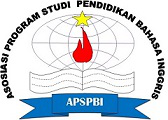The Effect of Hidden Words Game on the EFL Students' Vocabulary Mastery
Abstract
Keywords
Full Text:
PDFReferences
Clark, R. E. (1994). Media Will Never Influence Learning. ETR&D. 2(2), 21-29.
Derakhsan, A., and Khatir, E. D. (2015). The Effects of Using Games on English Vocabulary Learning. Journal of Applied Linguistics and Language Research. 2(3), 39-47.
Fudhla, N. (2013). Enhancing Student’s Vocabulary by Using Jumbled-Letter Game in English Language Teaching. Lingua Didaktika. 6(2), 102-108.
Gozcu, E & Caganaga, C.K. (2016). The Importance of Using Gmaes in EFL Classroom. Cypriot Journal of Educational Sciences, 11(3), 126-135.
Gros, B. (2014). Digital Games in Education, The Design of Games-Based Learning Environments. Journal of Research on Technology in Education, 40 (1), 23-38.
Hidayat, N. (2016). Improving Students' Vocabulary Achievement through Word Game. Journal of Educators Society, 1(2), 95-104.
Manik, S., & Christiani, M. (2016). Teaching Vocabulary Using Matching Word on Computer Assisted, Language Learning. International Journal of English Language Teaching. 4(7), 1-26.
Masri, A. A., and Najar, M. A. (2014). The Effect of Using Word Games on Primary Stage Students Achievement in English Language Vocabulary in Jordan. American International Journal of Contemporary Research. 4(9), 144-152.
Moeller, A., Ketsman, O., & Masmaliyeva, L. (2009) The Essentials of Vocabulary Teaching: From Theory to Practice. Diverse by Design. Central States Conference Report. Pp 1-16. Carolyn Guiscoigne and Melanie Bloom, EditorsEau Claire, WI: Crown Prints.
Nawayanti, R. (2013). The Effectiveness of Touch and Go Game in Teaching Vocabulary. (Undergraduate Thesis, Walisongo State Institute for Islamic Studies). http://eprints.walisongo.ac.id/1733/1/093411048_Coverdll.pdf.
Nugraha, F.F. (2017). Interactive Multimedia Use of Games Model on IPS School Study List. Journal of Elementary Education. 1(1), 17-24.
Orawiwatnakul, W. (2013). Crossword Puzzles as a Learning Tool for Vocabulary Development. Electronic Journal of Research in Educational Psychology. 11(2), 413-428.
Rixon, S. (1981). How to use games in language teaching. London: Macmillan.
Rohmah, O. N. (2014). The Effectiveness of Whispering Game to Teach Vocabulary. (Undergraduate Thesis, Muhammadiyah University of Purwokerto). http://repository.ump.ac.id/1232/1/Oktaviana%20Nur%20Rohmah_COVER.pdf
Shen, Z. (2008). The Roles of Depth and Breadth of Vocabulary Knowledge in EFL Reading Perfomance. Asian Social Science. 4(12), 135-137.
Silsupur, B. (2017). Does Using Language Games Affect Vocabulary Learning in EFL Classes? Journal of Foreign Language Education and Technology. 2(1), 83-104.
Zin, N. A. M. et al. (2009). Digital Game-based learning (DGBL) Model and Development Methodology for Teaching History. Wseas Transactions On Computers. 8(2), 322-333.
DOI: http://dx.doi.org/10.20527/jetall.v4i1.8705
Article Metrics
Abstract view : 918 timesPDF - 668 times
Refbacks
- There are currently no refbacks.
This journal is indexed in:


This Journal is listed in:
 Journal of English Teaching, Applied Linguistics and Literatures (JETALL)
Journal of English Teaching, Applied Linguistics and Literatures (JETALL)








.png)



1.png)
